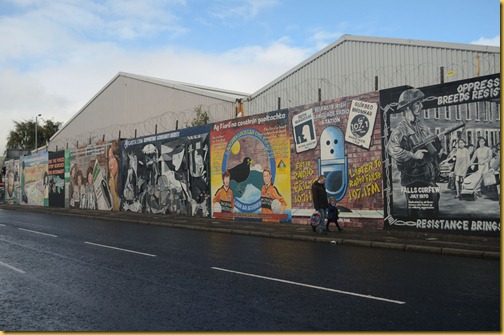
There are legends everywhere - from little men to giants. Lores and literature are written about mountains and rivers and valleys . Andrew Beggs, our guide, ever full of humour, with a quick repartee here and there, says that the Cave hill in Belfast was an inspiration to author Jonathan Swift for his novel, Gulliver�s Travels. The peak of the hill often referred to as Napoleon�s Nose looks like a giant sleeping, an uncanny resemblance to the sleeping giant in Swift�s novel.

But then the allusion to giants and little men does not end here. The mythical Leprechauns lure you to see their pots of gold hidden beyond rainbows but I can hardly see any colours in the sky . The weather abruptly changes from warm sunshine to rain and storm. We drive through the coastal villages in County Antrim, most of them are seaside resort towns. An icy cold wind bites into you as we step down to see the rope bridge.
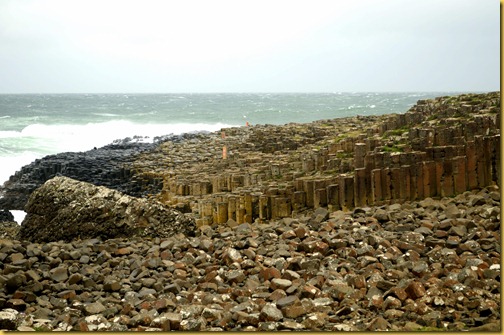
Referred to as the �rock in the road� the narrow �Carrick � a Rede Rope Bridge� connects the mainland to a tiny Carrick island. Precariously dangling over the sea , the view from the mainland is breath taking. But then the winds and waves ensure that we do not have a safe passage to the island and off we go, back to the coach, driving along the coast of Northern Ireland to the Giant causeway.
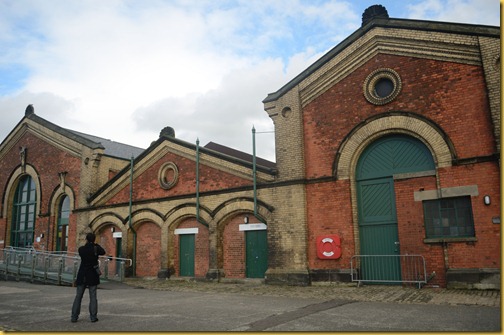
The winds literally knock me down as I lose balance and hold on to the rocks. �It�s the tail end of a hurricane, �says Andrew as he drops us and the coach beats a hasty retreat. Now, I am literally caught between the devil and the deep blue sea as the winds toss me away from the shores and I hang on to every piece of clothing that I have to stay warm and in one piece. But even in that grey mood, the scenery takes your breath away
The giant causeway is a result of a volcanic eruption that led to formation of interlocking basalt columns that tease your imagination. They come in many sizes and shapes. Sometimes you imagine boots, at other times, chimney stacks or even a camel�s hump as the basalt columns morph into various forms .The Irish love legends and they gave a story to this World UNESCO site as well. According to the myth, Irish warrior Finn Mc Cool built the causeway to connect to Scotland to defeat the giant Benandonner. Finn was tired and although he challenged the giant to walk across the causeway , he was not in a mood for a duel. He decided to sleep for a while, while the Scottish giant entered the house looking for him. Finn�s wife wrapped him up as a baby and the sight of a giant baby terrified Benandonner that he fled across the coast, ripping up the columns as he ran along the causeway.
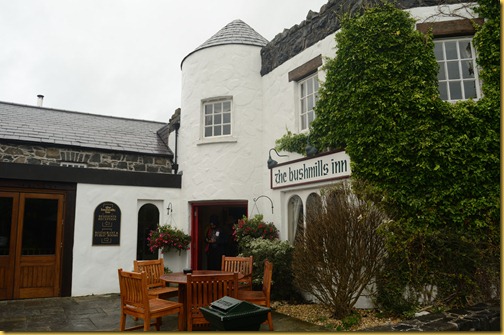
The cold gales give us no respite. We stagger around, probably a bit like the giant Benandonner trying to escape its blows and watch the waves lash against the rocks, unleashing its force all around them. It�s time for a nice warm whiskey and we make our way to a quaint little village, Bushmill, named after a river and a windmill, and drive past the oldest licensed distillery in the world � Old Bushill�s Distillery, established in 1608. We head out to the Bushmill�s Inn, also believed to have been built in the same year as the distillery, although parts of it have been restored and converted into a hotel. Lunching in a historic and a quaint inn has a different charm as we hear a bit of its history and drink and eat to our heart�s content, listening to the strains of �Whiskey in the Jar �
The coach moves on as we head towards Belfast, the capital town of Northern Ireland and we are immediately spoilt for choices. The Titanic tour for instance that takes you back to the days when the town went ballistic over the ill fated ship. You hear stories of hope and despair and visit those empty offices where the ship�s fate was decided well before it set sail, with barely 20 life boats.
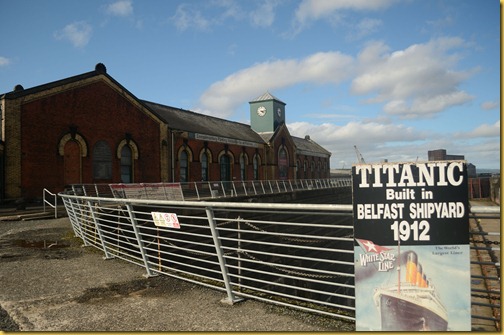
And then we are on the city tour, which gives you a peek into its troubled history when internal conflicts and wars ravaged the city for over three decades .Even today the murals and the high walls on the streets speak of the phase when the Catholics and Protestants communities were at loggerheads with each other .The mood turns a bit sombre as we hear stories of violence , but the Irish do not let it last long. We then admire the Edwardian architecture in the city driving past some towering monuments as we move from one quarter to another.
And before we know it, a day ends as we find ourselves quenching our thirst in the famous 19th century Crown Bar, listening yet again to �Whiskey in the Jar � followed by � Belle of Belfast. � It is true that as Shaw says, �Ireland, sir, for good or evil, is like no other place under heaven, and no man can touch its sod or breathe its air without becoming better or worse.� I believe I have become a wee bit better after my tryst with the Irish.
No comments:
Post a Comment